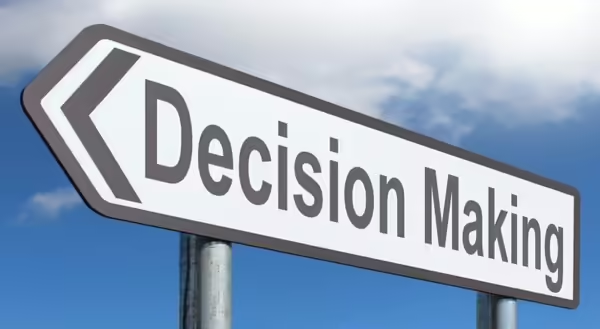
Most of us make minor decisions every day. What do I want for lunch? What should I drink for breakfast? Coffee, tea, juice, or milk?
There are more complex decisions that we make as well. These decisions weigh more heavily because they impact our lives in many ways. As we transition into 2023, individuals reflect on success, re-evaluate what choices were made, and consider new options.
Making difficult decisions can be overwhelming. Biases, reason, emotions, and memories influence decisions. Once we decide, we must live with the consequences. Poor decision-making may happen because there is missing or incomplete information, pressure to decide immediately, or limited physical or emotional resources. Be careful not to mistake opinions for facts and be aware of the importance of learning from our past errors.
Encountering an unfamiliar decision-making situation may take time to weigh potential benefits and risks when choosing a course of action. Thinking critically is key to making good decisions without surrendering to common errors or biases. To counteract the biases, one must explore what knowledge is lacking and what to do to obtain it.
Our preference is to stick with something we know instead of choosing something different. Sometimes we see the change as too risky or not worth the trouble, even if it might be better. Make informed decisions based on facts rather than intuition or the “I think” attitude. Analyze the information that’s available to you and ask the following questions:
- Are there any key details I may be missing?
- Am I being misled by something?
- Could I be thinking about this in another way?
Once you have answered those questions consider the following steps in making a difficult decision:
- Accept that panic, fear, and lack of self-confidence are often part of the process.
- Get enough sleep so you can think clearly. Fatigue makes it difficult to even think about making decisions, let alone what’s right or wrong.
- Keep priorities straight. Make a pros and cons list and score by importance. Give each bullet a score with 10 as absolute importance to one as very little importance. Look at the long-term benefits and not just the immediate gain.
- Carefully weigh the trade-offs. Imagining possible outcomes might give you some perspective on the decision. Even thinking in the third person could help. Sometimes it helps to step outside yourself and pretend you’re helping someone else.
- Commit to a decision even if the decision is flawed. Second-guessing and feeling indecisive are just a part of the process. Can you settle for a good-enough outcome?
- Follow-through is essential. Once you have walked yourself through the steps, it is vital to move forward.
As we start the new year, reflect on your success, review the things you want to change, and consider the steps to successful decision-making. As Theodore Roosevelt has been quoted, “In any moment of decision, the best thing you can do is the right thing, the next best thing is the wrong thing, and the worst thing you can do is nothing.”
Source: Psychology Today and GCFGlobal
MEET THE AUTHOR: Tessa Hobbs-Curley is considerate about the people of west-central Illinois. She feels that her role as a family life educator serving Henderson, Knox, McDonough, and Warren counties is vital to the residents in her community. Tessa provides community-based training and education on life issues affecting families, adults, and individuals as they age.